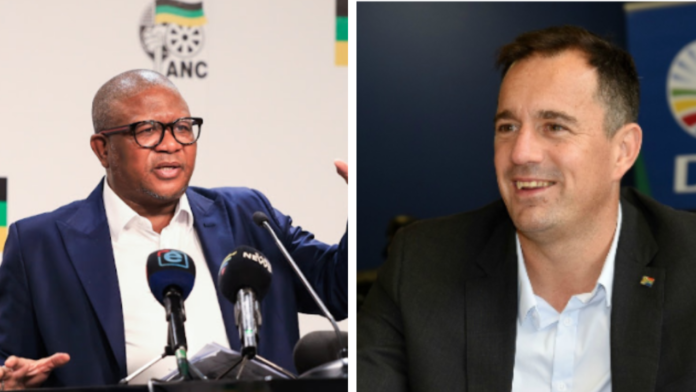Across South Africa, several political leaders took to social media to celebrate a significant milestone in their families: their children’s first vote. These moments are not only reflective of democratic engagement but also a source of immense pride for these leaders.
Fikile Mbalula, the ANC Secretary-General, shared an image on social media of his daughter with her thumb marked, a signifier of having cast her vote.
Mbalula captioned the photo, emphasizing it as a “day for democracy,” underscoring the importance of young people participating in the electoral process.
[ How Interactive Games Are Luring SA Youth Into Betting ]
My daughter voted today first time voter 👌👌👌👌👌👌🫶🫶🫶🫶🫶democracy lives ! #IamvotingAnc #leadusRamaphosa pic.twitter.com/zpesd3hoLA
— ANC SECRETARY GENERAL | Fikile Mbalula (@MbalulaFikile) May 29, 2024
Similarly, Solly Msimanga, the DA Gauteng Premier candidate, was delighted as his 18-year-old son voted for the first time.
Msimanga shared a humorous exchange about his son’s voting choices, highlighting the excitement and curiosity that accompany a first-time voting experience. The light-hearted interaction also demonstrated the blend of familial bonds and civic duty.
Ayanda Allie, representing Build One South Africa, used the phrase “proud mama moment” in her post, capturing the emotional significance of her child’s first vote. This sentiment was echoed by many, illustrating how personal and political spheres intertwine during such democratic milestones.
My boy is all grown up!
He voted for the first time today.
Proud mama moment 🤍 pic.twitter.com/HNRIbovGFV— Ayanda Allie (@AyandaAllie) May 29, 2024
DA leader John Steenhuisen also experienced this proud moment as his daughter cast her first ballot in Cape Town. His social media post reflected a sense of fulfillment, seeing the next generation actively participating in shaping the country’s future.
CORRECTION: John Steenhuisen is was with his other daughter here. The one who is a first time voter was in Cape Town. #sabcnews https://t.co/rupl7nH2uJ
— #LordOfTheMedia (@samkelemaseko) May 29, 2024
In KwaZulu-Natal, ActionSA’s premier candidate Zwakele Mncwango was photographed with his daughter at a polling station. Mncwango shared his pride on social media, capturing a candid moment that resonated with many parents and political figures alike.
These instances shared widely on social platforms, highlight not only the personal pride felt by these leaders but also the broader significance of youth engagement in democratic processes. The act of voting for the first time is a rite of passage that connects generations, reinforcing the values and responsibilities of citizenship.
Youth engagement in South Africa’s democratic process has seen a remarkable surge, reflecting a growing interest among young citizens in shaping their nation’s future.
According to the Electoral Commission of South Africa, an impressive 4.9 million individuals under the age of 30 registered to vote in the most recent elections.
Notably, women constituted a significant portion of this demographic, with 2.7 million young women registering to cast their ballots. This heightened involvement among young voters, particularly women, signals a pivotal shift in the country’s electoral landscape.
Among these registered voters, nearly one million were aged between 18 and 19, marking their first opportunity to participate in the democratic process.
This influx of first-time voters is indicative of a broader trend of increased political awareness and activism among the youth. Their enthusiasm and proactive engagement are not only pivotal for the present but also hold substantial implications for future elections in South Africa.
Political analysts have noted this demographic shift with keen interest. Experts suggest that the active participation of young voters could lead to a more dynamic and representative political environment.
According to political analyst Dr Nomsa Maseko, “The engagement of young voters is a testament to the evolving political consciousness in South Africa. Their participation not only enriches the democratic process but also ensures that the voices of the younger generation are heard and considered in policymaking.”


